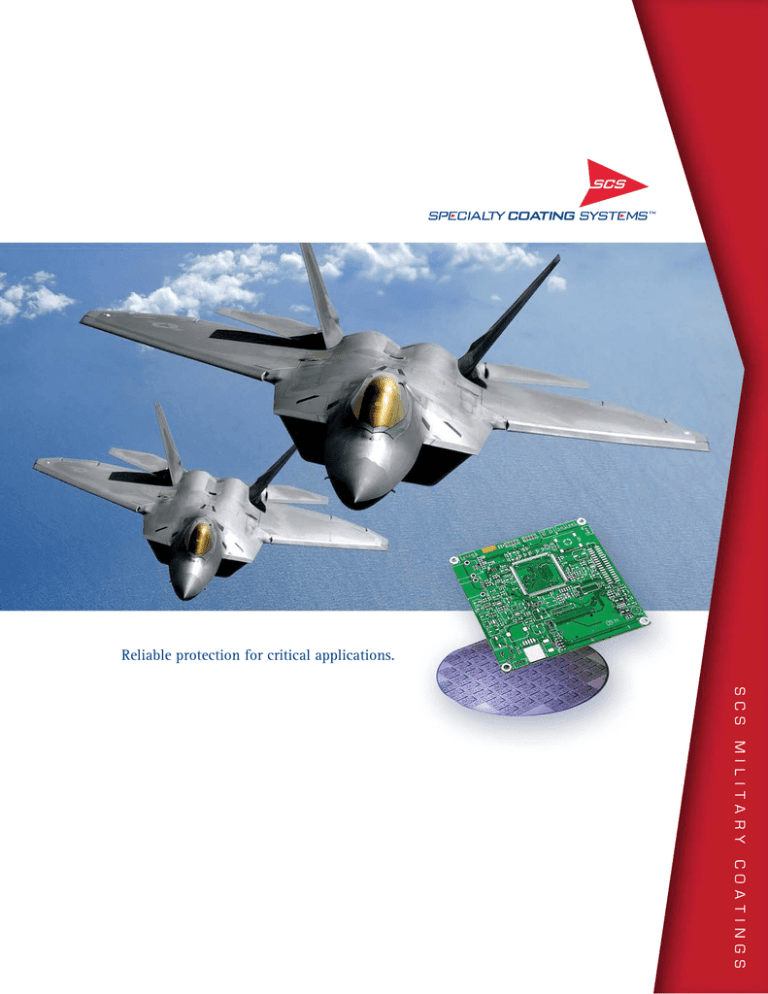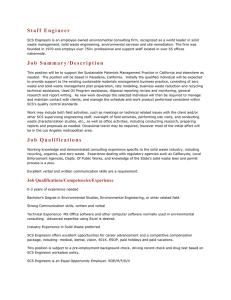
Reliable protection for critical applications.
SC S
MILI T ARY
C OAT I NG S
Specialty Coating Systems is the global leader in delivering Parylene conformal
coating solutions for advanced technologies. For more than four decades,
customers have turned to SCS for the planning, development, engineering and
applying of thin-film Parylene polymer coatings to their critical components.
A team of the world’s foremost Parylene specialists, strict quality control systems,
and state-of-the-art coating facilities across the Americas, Asia and Europe
ensure SCS customers receive the most innovative, precise and consistent
coating processes . . . for components and applications where compromise is
not an option.
From electronic devices within military
aircraft, missile and ground systems to
components that must operate in the depths of
space, SCS Parylene conformal coatings provide
reliable protection to ensure long, trouble-free life.
Substances (RoHS). SCS has lead-free, halogen-free
and low VOC initiatives to support our customers.
For more information about SCS certifications and
standards, visit SCScomplies.com.
Metal Whisker Mitigation
SCS Parylene Coatings
Ultra-thin and pinhole-free, SCS Parylene coatings
offer exceptional properties for electronic component
protection. Parylene coatings are applied in a vacuum
chamber via a vapor deposition polymerization (VDP)
process. Components to be coated are required to have
only a reasonable vacuum tolerance. There are no
solvents, catalysts or plasticizers involved in the
coating process and, since Parylene deposition occurs
at ambient temperatures, there are no associated
cure stresses.
As a result of industry directives, pure metal plating
is replacing lead in the solders used throughout
the worldwide electronics industry. While safer
for the environment, metal plating is known to
form whiskers, which cause reliability problems for
electronic systems. Parylene coatings suppress the
formation of metallic whiskers, OSEs (odd shape
eruptions) and dendrites.
SCS combines the properties of Parylene with its
years of experience, vast technology and worldwide
resources to provide Parylene coatings and services
you can rely on, including Parylene HT®, specifically
engineered to withstand the most extreme conditions
in the industry.
SCS Parylenes have excellent dielectric properties.
Their high dielectric strength is attributable to the
fact that they can be formed as thin, continuous
films, free from defects and the fillers commonly
found in conventional coatings, both of which tend
to reduce dielectric strength.
The benefits of SCS Parylene coatings include:
SCS Parylene HT has the lowest dielectric constant
and dissipation factor and a high dielectric strength,
in comparison to industry standard coatings, enabling
electrical signal transfer without absorption or loss.
• Excellent dielectric properties
• Excellent chemical and moisture barrier
• Ultra-thin, conformal coating of all
exposed surfaces
• Excellent crevice and multi-layer penetration
• Thermal stability up to 450°C (short-term)
• Unparalleled ultraviolet stability
Environment-Friendly
Coatings and Processes
SCS Complies
As worldwide industry requirements and directives
continue to evolve, SCS is at the forefront ensuring
our products and services comply with relevant
regulatory, environmental and biological standards.
SCS coating centers maintain AS9100C certifications.
Additionally, SCS Parylenes comply with the European
Union’s Restriction on the use of Hazardous
Parylene Coating Properties that Protect
Dielectric Properties
Thermal Stability
Many components in the military and aerospace
industries require protection in the midst of extreme
environments. SCS Parylene HT is specifically
engineered to provide long-term thermal stability
up to 350°C, with short-term stability up to 450°C,
offering excellent protection to many automotive,
military and aerospace applications.
Barrier Properties
SCS Parylene coatings are excellent moisture and
chemical barriers. Applied in the micron range,
much thinner than industry standard coatings,
Parylene provides a superior pinhole-free,
uniform barrier to protect against corrosive
liquids, fluids, gases and chemicals, even at
elevated temperatures.
Figure 1: Circuit boards after 144 hours of salt-fog exposure
Coated with SCS Parylene HT
Uncoated
Circuit boards coated with SCS Parylene HT were
salt-fog tested by an independent testing facility.
The coated boards showed no corrosion or salt
deposits after 144 hours of exposure in accordance
to ASTM B117-(03) (See Figure 1). Boards coated
with Parylene C exhibited similar results.
UV Stability
SCS Parylene HT offers measurable UV stability
after more than 2,000 hours of UV exposure
(ASTM G154). Its chemical structure provides
protection from degradation and discoloration
as a result of such exposure.
Parylene C-UVF™
Because Parylene coatings are optically clear,
there is an inherent level of difficulty involved
in identifying if a component has been coated
with Parylene. As a solution to this challenge,
SCS has developed a unique technology to assist
customers in the process of identifying Parylene
coated boards — SCS Parylene C-UVF. For more
information about this product, contact SCS.
Parylene also ensures trouble-free performance life
for emission control, engine management and fuel
Space
Parylene has a long history of protecting
components used in satellites, space-borne
instrumentation and vehicles. Since Parylene is
applied in a vacuum, there are no hidden voids
or incomplete coverage which, when exposed
to altitude, may present a pathway for failure.
Parylenes offer excellent dielectric properties
since they are formed as thin, continuous films,
free from defects and fillers that tend to reduce
dielectric strength.
Please reference http://Outgassing.NASA.gov
for further information on the use of Parylene
in space applications.
Aviation
Aircraft manufacturers are continually seeking ways
to reduce weight in order to increase operating
efficiencies. Parylene coatings, which are typically
applied in micron-level thickness, are ultra-thin and
lightweight. The coatings provide avionic components
with excellent barrier properties, including pinholefree protection from corrosive liquids, fluids, gases and
chemicals, even at elevated temperatures. Parylene is
an ideal coating for circuit boards, sensors and other
components used to monitor electrical, air handling,
fuel and engine systems, and flight control systems.
SCS Parylene HT® offers excellent UV stability,
providing a reliable solution for interior and
exterior LED applications. In addition, Parylene
does not contain any fillers, so there is very little
light reduction.
SCS Parylene Services
For over 40 years, SCS has been the leader in
providing Parylene conformal coating services
and technologies to the military, aerospace and
avionics industries. Through 11 locations around
the world, SCS reliably meets small and large
volume customer demands while maintaining the
most stringent quality standards in the industry.
For more information on SCS and Parylene
coatings, contact SCS.
C OAT I NG S
As the military continues to integrate COTS
(commercial off-the-shelf) components, which
were not specifically designed for demanding
environments, into their systems, Parylene provides
protection to increase the life of these components.
The coating’s outstanding barrier and complete
encapsulation properties provide reliable protection
for critical applications.
When space is a premium and weight is a
determining factor, Parylene coatings provide
unmatched protection for critical electronic systems.
MILI T ARY
Military
The UAV (unmanned aerial vehicle) segment
continues to expand into new categories such as
micro, autonomous land and underwater vehicles.
Parylene is an ideal conformal coating in these
applications due to its ultra-thin and lightweight
nature. Additionally, Parylene is optically clear
and does not interfere with electrical, optical
or RF signals.
SC S
Useful in Many Electronic Applications
SCS can apply Parylene coatings to virtually any
surface material, including metals, elastomers,
resins, plastics, ceramics and glass, in thicknesses
ranging from a few hundred angstroms to several
mils. Parylene polymerizes as a uniform, thin-film
coating that conforms to all surfaces, edges and
crevices of a substrate, including the interior of
multi-layer electronic packages. As a result of its
ultra-thin application, Parylene adds little dimension
or mass to critical, weight-sensitive components.
systems used in automotive and heavy-duty military
vehicle applications.
Table 1: SCS Parylene Properties
1
5,400
5,600
7,000
Acrylic
(AR) a,b
3,500
60 Hz
1 KHz
1 MHz
2
2.21
2.20
2.17
3.15
3.10
2.95
2.65
2.65
2.65
–
–
2.7 – 3.2
3.3 – 4.6
–
3.1 – 4.2
4.1
–
3.8 – 4.4
3.1 – 4.2
–
3.1 – 4.0
60 Hz
1 KHz
1 MHz
2
<0.0002
0.0020
0.0010
0.020
0.019
0.013
0.0002
0.0002
0.0006
0.04 – 0.06
–
0.02 – 0.03
0.008 – 0.011
–
0.004 – 0.006
0.038 – 0.039
–
0.068 – 0.074
0.011 – 0.02
–
0.003 – 0.006
3, 4, 5
0.22
0.08
0.59
13.9C
0.94C
0.93 – 3.4C
1.7 – 47.5C
6
< 0.01
< 0.1
< 0.1
0.3
0.05 – 0.10
0.6 – 0.8
0.1
350°C
450°C
80°C
100°C
60°C
80°C
82°C
–
177°C
–
121°C
–
260°C
–
Dielectric Strength V/mil
Dielectric Constant
Dissipation Factor
Water Vapor Transmission
Rate (g•mm)/(m2•day)
Water Absorption
(% after 24 hours)
Method
Parylene HT
Parylene C
Parylene N
Service Temperature Continuous
Short-Term
Epoxy
(ER) a,b
2,200
Polyurethane
(UR) a,b
3,500
Silicone
(SR) a,b
2,000
UV Stability
7
> 2,000 hrs
<100 hrs
<100 hrs
–
–
–
–
Tensile Strength (psi)
8
7,500
10,000
7,000
7,000 – 11,000
4,000 – 13,000
175 – 10,000
350 – 1,000
50 x dia.
5 x dia.
40 x dia.
Spray or Brush
Spray or Brush
Spray or Brush
Spray or Brush
Penetration Ability d
a. Handbook of Plastics, Elastomers, and Composites,
Chapter 6, “Plastics in Coatings and Finishes,” 4th Edition,
McGraw Hill, Inc., New York, 2002.
b. Conformal Coating Handbook, Humiseal Division,
Chase Corporation, Pennsylvania, 2004.
c. Coating Materials for Electronic Applications, Licari, J.J.,
Noyes Publications, New Jersey, 2003.
d. Depth into tubing and crevices.
Test Methods:
1. ASTM D 149
2. ASTM D 150
3. ASTM F 1249 (at 100% RH, 38oC)
(Parylene HT only)
4. ASTM F 1249 (at 90% RH, 37oC)
(Parylene C only)
5. ASTM E 96 (at 90% RH, 37oC)
(Parylene N only)
6. ASTM D 570
7. ASTM G 154
8. ASTM D 882
Innovative solutions for advanced technologies.
Specialty Coating Systems leads the industry in providing Parylene solutions for its global customers’ advanced
technologies. SCS is a direct descendant of the companies that originally developed Parylene, and we have more
than 40 years of experience and expertise that we leverage on every project for our customers—from the initial
planning phases, to advanced engineering, to the development of application processes.
Our worldwide resources include highly experienced sales engineers, some of the world’s foremost Parylene
specialists, and expert manufacturing personnel, working in eleven state-of-the-art coating facilities around
the globe. In addition to Parylene coating services, we design and manufacture industry-leading Parylene
deposition systems; liquid spray, dip and spin coating systems; ionic contamination test systems; and UV
and thermal cure units. Our equipment is used in environments that range from university and research labs
to high-volume production applications.
Our extensive and proactive approach to production and quality requirements—testing, validating, documenting
and processing—provides our customers peace of mind and minimizes their resources needed to meet the most
challenging industry specifications and quality requirements.
World Headquarters 7645 Woodland Drive, Indianapolis, IN 46278 USA
T F 800.356.8260 P 317.244.1200 F 317.240.2739 W scscoatings.com
© Copyright 2011 Specialty Coating Systems, Inc. All rights reserved. Covered by patent rights issued and/or pending. SCS test data herein may not be copied, reproduced or referenced
without express written permission of SCS. Specialty Coating Systems, SCS, Parylene C-UVF and Parylene HT are registered trademarks of Specialty Coating Systems, Inc.
004 12/11



